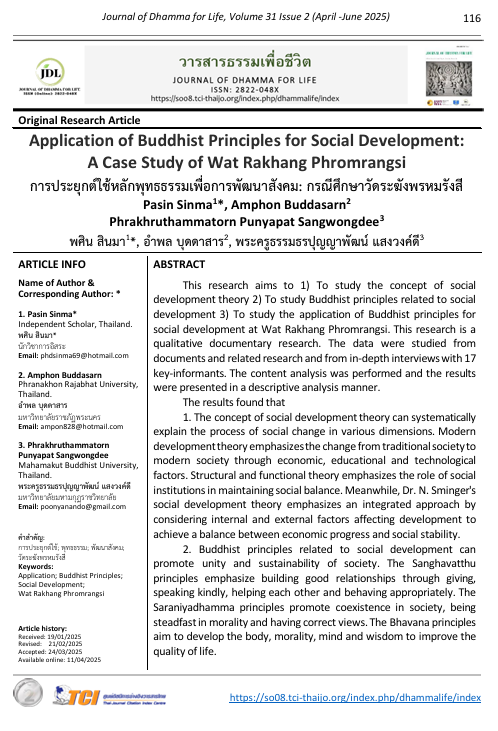Application of Buddhist Principles for Social Development: A Case Study of Wat Rakhang Phromrangsi
Main Article Content
Abstract
This research aims to 1) To study the concept of social development theory 2) To study Buddhist principles related to social development 3) To study the application of Buddhist principles for social development at Wat Rakhang Phromrangsi. This research is a qualitative documentary research. The data were studied from documents and related research and from in-depth interviews with 17 key-informants. The content analysis was performed and the results were presented in a descriptive analysis manner.
The results found that
- The concept of social development theory can systematically explain the process of social change in various dimensions. Modern development theory emphasizes the change from traditional society to modern society through economic, educational and technological factors. Structural and functional theory emphasizes the role of social institutions in maintaining social balance. Meanwhile, Dr. N. Sminger's social development theory emphasizes an integrated approach by considering internal and external factors affecting development to achieve a balance between economic progress and social stability.
- Buddhist principles related to social development can promote unity and sustainability of society. The Sanghavatthu principles emphasize building good relationships through giving, speaking kindly, helping each other and behaving appropriately. The Saraniyadhamma principles promote coexistence in society, being steadfast in morality and having correct views. The Bhavana principles aim to develop the body, morality, mind and wisdom to improve the quality of life.
3. Wat Rakhang Phrommarangsi applies the principles of the Sanghavatthu in community development and activities within the temple by helping the poor, promoting good relationships between monks and laity, creating jobs and income for those who help the temple and managing resources in a transparent manner. The temple also uses the principles of the Saraniyadhamma to create unity and mutual assistance, including the use of the Four Bhavana principles to enhance the quality of life for both monks and laity.


